Elementor review
In our Elementor review, we take a close look at this popular WordPress page builder, and see if it's the plugin for you

Elementor is one of our favorite WordPress website building plugins, and it’s backed by a tidy user interface and an excellent range of integrated tools.
-
+
Streamlined WordPress website creation
-
+
Very competitively priced
-
+
Great range of editing tools
-
-
Somewhat unorganized and confusing to use
-
-
The free option is quite limited

Rankings for the best website builder usually feature all-in-one solutions such as Wix or Weebly. However, using a WordPress website builder plugin like Elementor with WordPress is also a great option, as it offers increased flexibility, full control over your own site, and an excellent range of beginner-friendly editing tools.
Elementor review: Snapshot
In case you haven’t heard of Elementor before, it’s a plugin that offers much more advanced page-building tools than the native WordPress editor. Free and premium versions are available, and you will benefit from a selection of advanced templates, a section-based editor, and numerous tools to help you get the most out of your site.
In our Elementor review, you will find out more about this popular site creation option. Discover why it’s up there with our favorite WordPress page builders, and find out when and why you should seriously consider using it to create your website.
Score: 4/5
Read on for the full Elementor review.
Elementor's competitors
How does Elementor compare to its main competitors?
| Header Cell - Column 0 | Elementor | Divi | Beaver Builder |
|---|---|---|---|
| Score | 4/5 | 3.5/5 | 4.5/5 |
| Pros | - Streamlined WordPress website creation - Very competitively priced - Great range of editing tools | - A huge selection of advanced templates - Responsive, mobile-friendly editing | - Excellent selection of modern design and editing tools - Clean, bug-free code creation - Reliable and beginner friendly |
| Cons | - Somewhat unorganised and confusing to use - Free option is quite limited | - No popup builder - Can be a little glitchy at times - Too many tools for the average user | - Quite expensive compared to other options - No free version |
| Verdict | `Elementor is one of our favorite WordPress website building plugins, and it’s backed by a tidy user interface and an excellent range of integrated tools. | Divi is a WordPress visual page builder that’s designed to replace the native editor. It’s a powerful option that makes it easier than ever for beginners to create their new site. | Beaver Builder is a WordPress page builder plugin that’s known for its clean code, intuitive user interface, and developer-friendly nature. |
| View deals | <a href="https://elementor.com/?ref=21451&campaign=hawk-affiliate-tracking">Visit site</a> | <a href="https://www.elegantthemes.com/gallery/divi/">Visit site</a> | <a href="https://www.wpbeaverbuilder.com/">Visit site</a> |
Elementor: Key features
Elementor is one of the best and most popular WordPress page builder plugins available. It’s backed by an excellent range of advanced features, and we’ve outlined a few of the most impressive below.
One notable feature is Elementor’s theme builder, which essentially enables you to customise every aspect of your site’s global appearance. Here, you can edit elements that appear on multiple pages, ensuring you maintain a consistent, attractive design across the board.
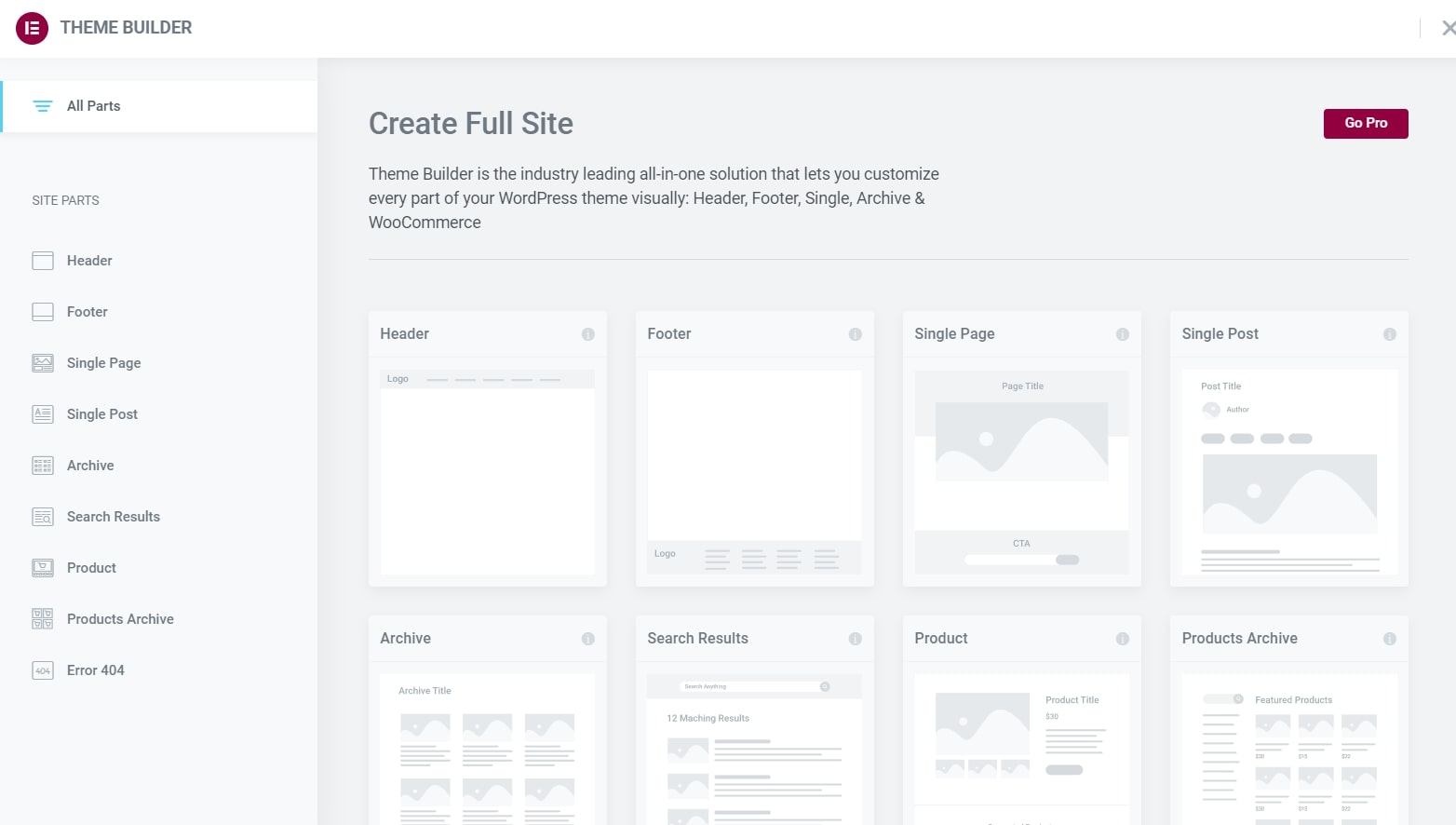
The theme builder is only available with a premium subscription, but it will be worth the extra cost for many users. You will be able to edit your site’s header, footer, blog post appearance, product pages, and virtually everything else you can think of.
Those who plan to add an ecommerce store to their new website will love Elementor’s WooCommerce support. There are numerous widgets designed to help you set up your store in a fast, efficient manner.
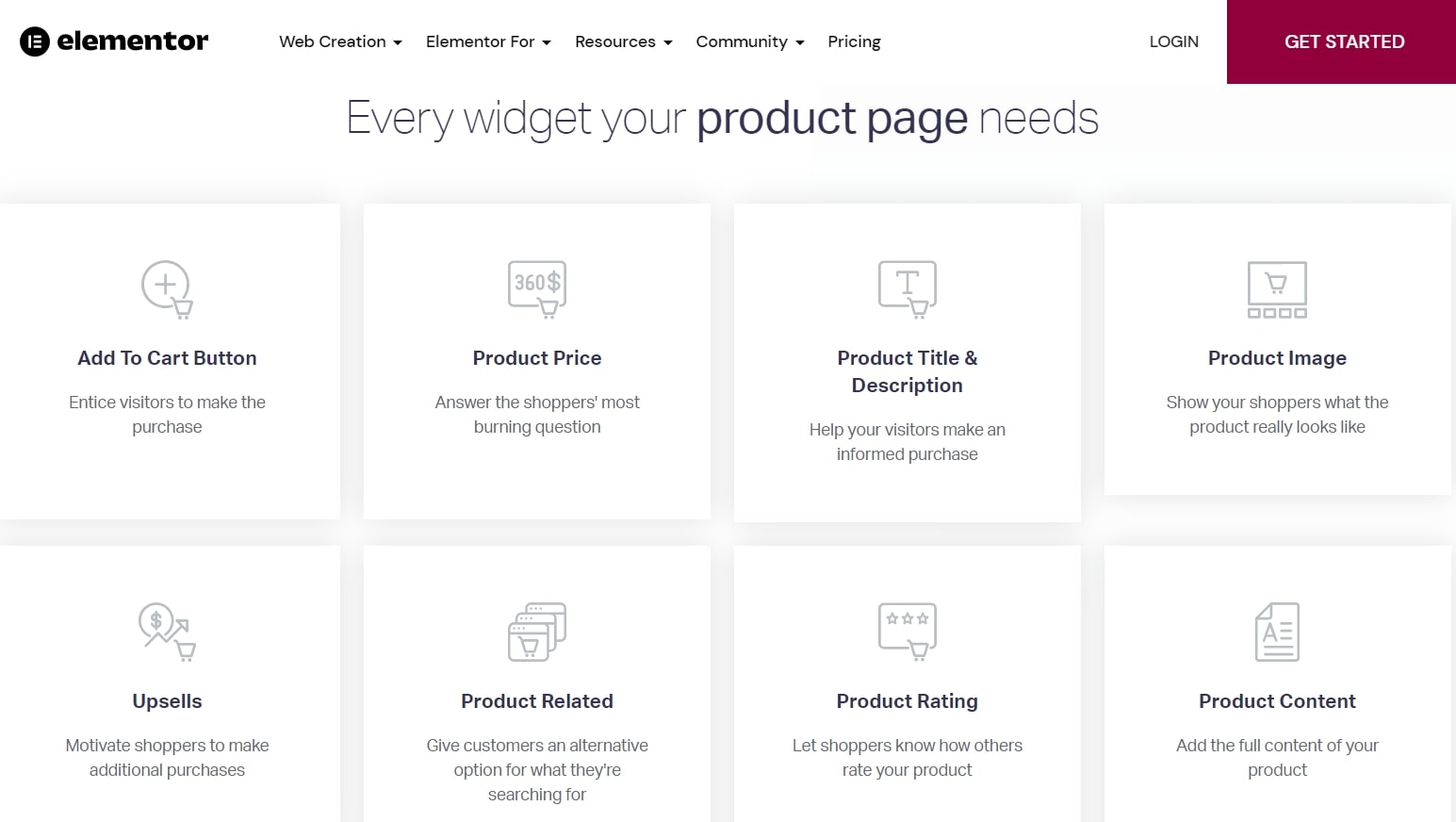
Each widget is specifically built to add certain design elements. Along with the expected product description, image, and price widgets, you will benefit from more advanced options such as product ratings, upsells, and a related product slider.
Another standout feature is Elementor’s highly customisable form builder. This is designed to help you add advanced forms to your website, enabling you to collect customer information and data as required.
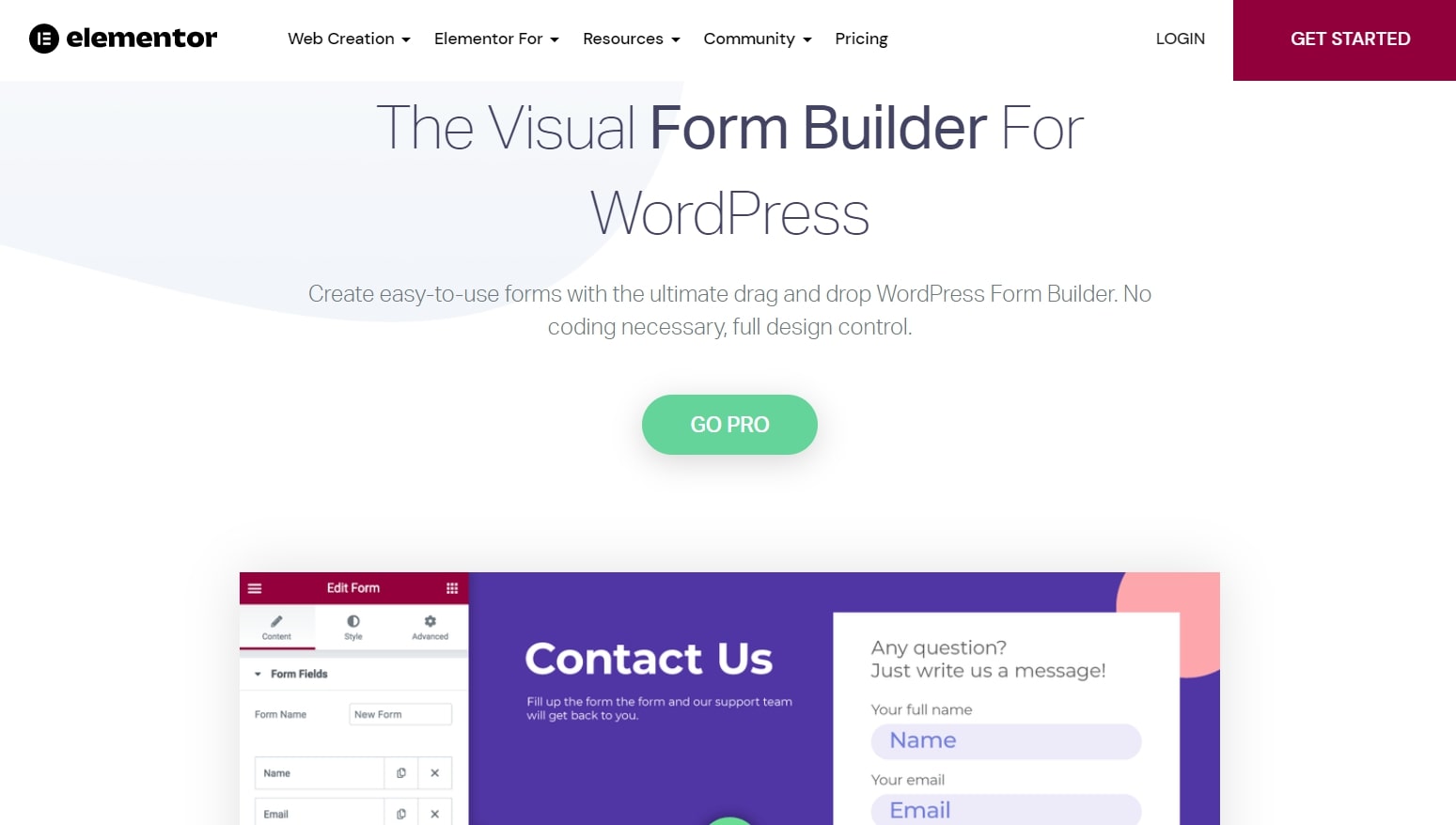
You will be able to configure every aspect of your form’s layout and appearance. Change colours, fonts, element spacings, and more. There are dedicated data collection fields, enabling you to collect everything from names to phone numbers, email addresses, and simple text input.
Finally, there are numerous advanced developer tools that you can draw on to help you get the most out of your site. These won’t be useful for beginners who are using Elementor because of its intuitive editor, but they offer excellent versatility for more experienced users.
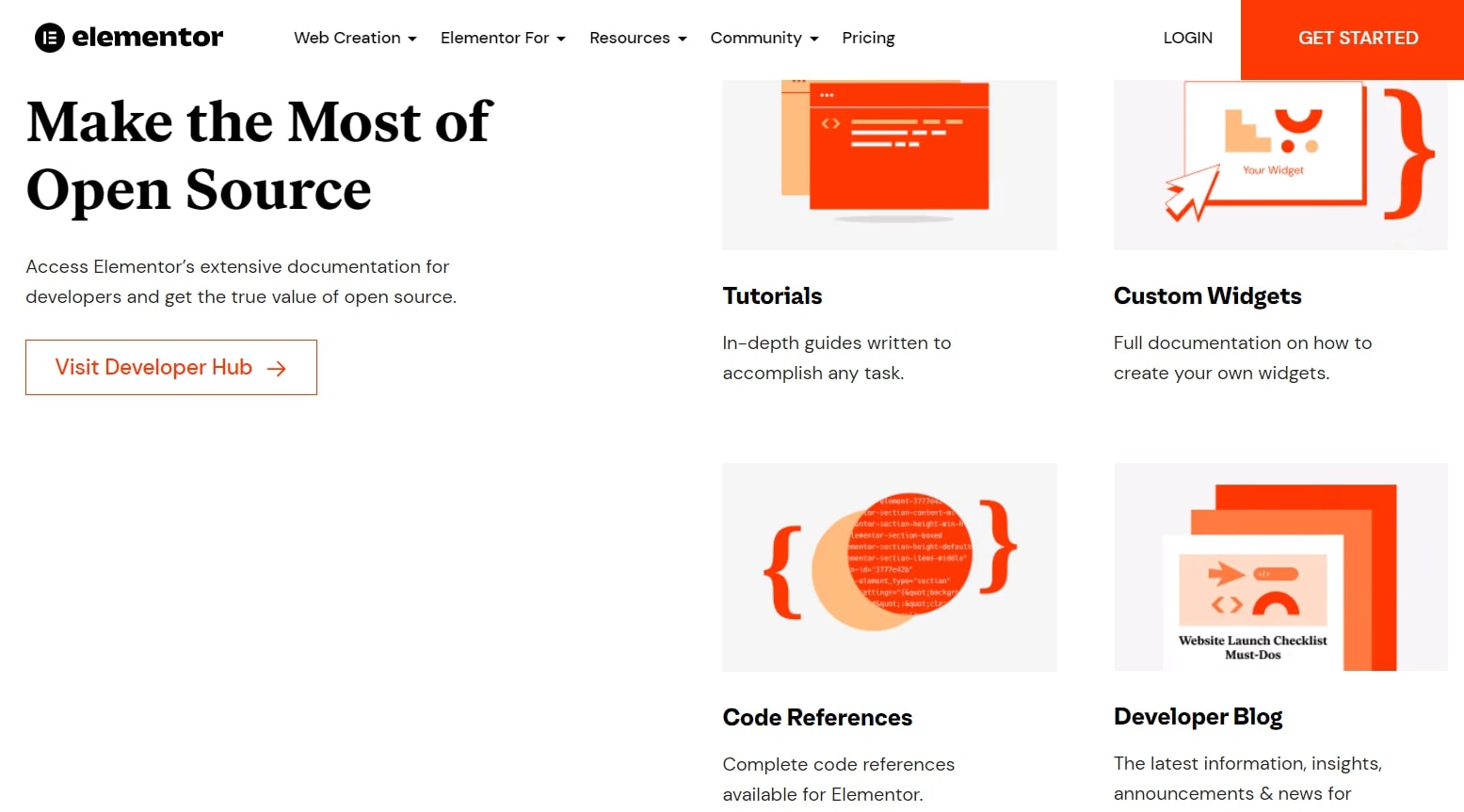
Standout features include a complete Elementor code reference guide, the ability to create custom widgets for your site, and full HTML and CSS code support. Take advantage of the suite of in-depth tutorials, and use the Elementor API to extend your site’s functionality.
Elementor: What’s new in 2022?
Elementor has a full changelog that outlines all updates and new features. New versions are released every month or so, and a selection of interesting features are added each time.
Some of the most recent updates added video playlist and hotspots widgets, which are both designed to help you optimise the user experience. A PayPal button was added in March 2021, which enables users to easily accept payments. A February 2021 update added streamlined custom code snippet support, which you can use to add custom elements to your site in a fast, streamlined manner.
Elementor: Pricing
Elementor is available with one free and five premium subscription options. Only annual payments are available, but the free forever plan comes with enough tools for you to test the editor. These include more than 40 widgets, more than 30 templates, and basic support.
Premium plans range from £40.16 to £818.76 a year. The main difference between these is the number of websites that you can create, which ranges from one with an Essential plan to 1,000 with an Agency subscription. The other notable difference is the level of support that’s available, and the three most expensive plans enable you to create an Elementor Expert Profile to showcase your portfolio.
Elementor's pricing plans
| Plan type/feature | Free | Essential | Expert | Studio | Agency |
|---|---|---|---|---|---|
| Cost per month* | Free | £3.34* | £13.59* | £34.08* | £68.23* |
| Cost per year | Free | £40.16 | £163.10 | £408.97 | £818.76 |
| Pro websites | One free site | One | 25 | 100 | 1,000 |
| Widget | 40+ | 90+ | 90+ | 90+ | 90+ |
| Templates | 30+ | 300+ | 300+ | 300+ | 300+ |
| Support | Limited | Premium | Premium | VIP | VIP |
*Monthly billing isn’t available. All subscriptions must be paid on an annual basis.
Testing Elementor
In order to comprehensively compare Elementor to the competition, we analysed a series of its features and tools to see how it performed. This included both its installation process and its webpage editor, both of which are key to its operation as a WordPress plugin.
How easy is it to install Elementor?
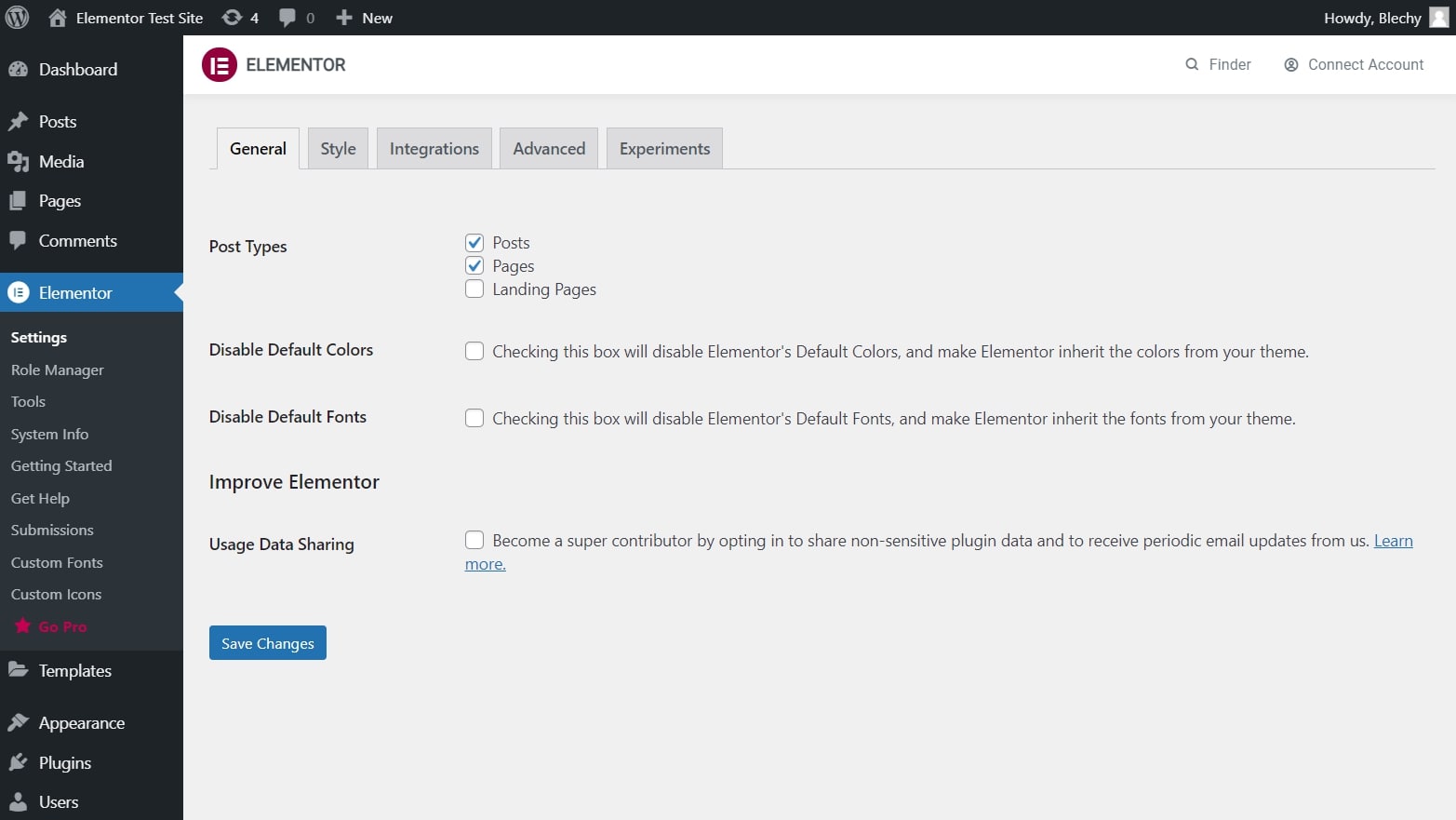
Elementor is a WordPress page builder plugin, which means that you will need to install and set it up before you can use it. Fortunately, this is a fast, streamlined process that you shouldn’t have any trouble with.
Once you’ve signed up with one of the best web hosting providers offering the best WordPress hosting, and installed WordPress, head over to your admin dashboard. Navigate to the Plugins tab and hit the "Add New" button. Search for the Elementor plugin, click "Install Now", and wait a few moments for it to be added to your site.
Ensure the plugin is enabled, and then head over to the Elementor tab on the left of the screen to begin customising your experience. Here, you can specify a range of global settings, access custom font and icon options, and take advantage of a selection of specialised tools.
How does Elementor's site editor work?
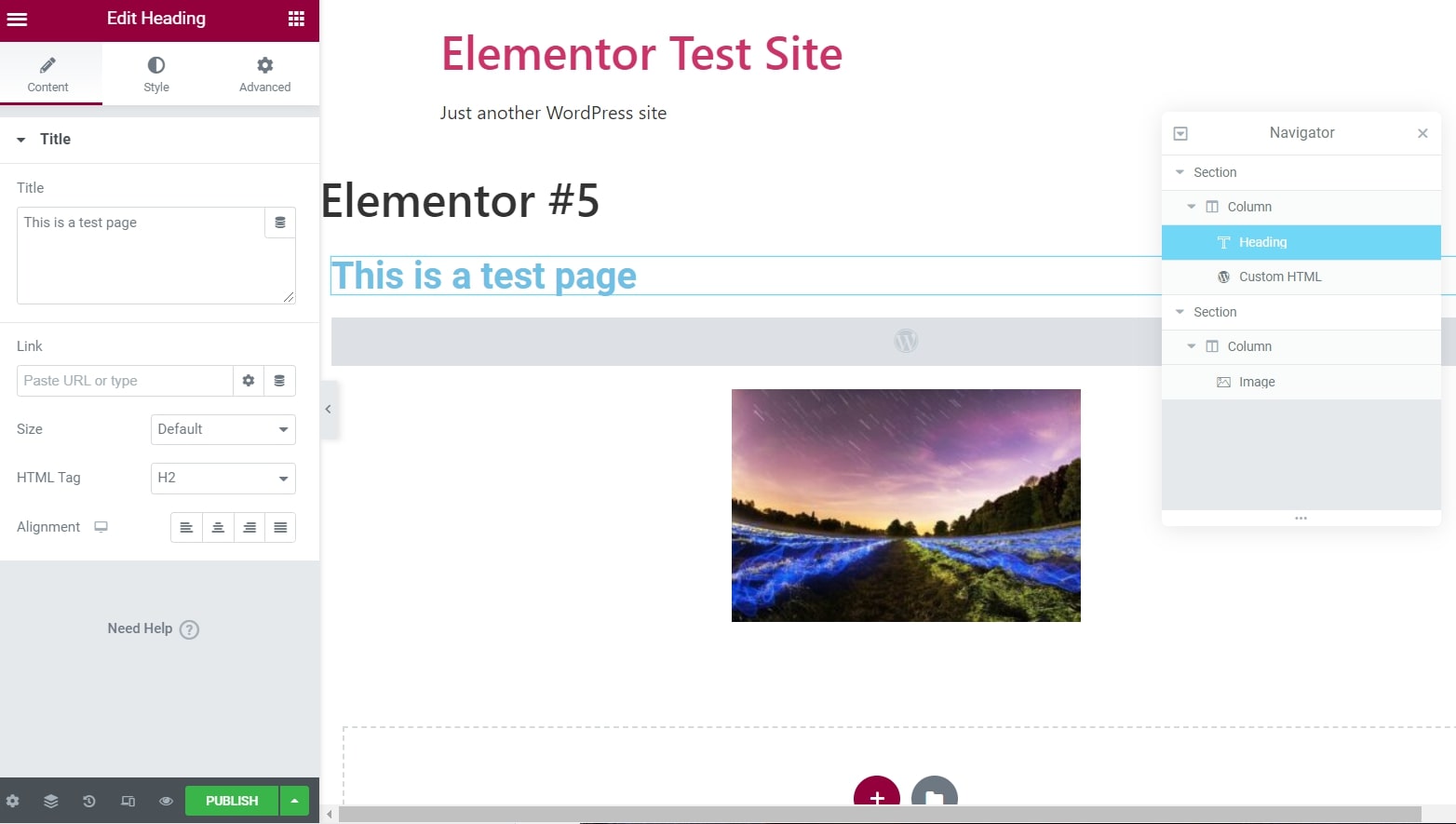
One of our favorite things about the Elementor page builder is its beginner-friendly user interface. The editor is versatile and intuitive, and it boasts much more power than the native WordPress editor.
To access it, navigate to the pages tab on your WordPress editor and hit the "Edit With Elementor" button on the page you want to customise. You will be taken directly to the editor, where you can add and remove widgets, personalise content, and change virtually every aspect of your site.
On the left of the screen, you will find a menu that enables you to add new widgets, specify global design settings, and more. Click a section on the page you’re editing to add your own content, and take advantage of the navigator panel to keep track of the elements you’re using.
Another neat feature is the ability to edit your site’s layout and appearance in separate desktop, tablet, and mobile formats. This is excellent, particularly for those with a large amount of complex content which may respond strangely to different screen sizes.
Alternatives to Elementor
Elementor is arguably the most popular WordPress page builder on the market today. It’s backed by an intuitive user interface, and it’s one of the easiest page builders to set up and use that we’ve tested.
The free plan is quite basic, but premium subscriptions start at an affordable £40.16 a year. All premium plans come with more than 300 templates that you can base your site on; a selection of over 90 advanced widgets; and full access to the Elementor builder. You will also benefit from additional tools such as a popup builder, full CSS code access, integrations with over 20 third-party platforms, and more.
Divi is another popular option, but it starts at a much more expensive £72.94 a year. This gives you access to more than 800 premium designs, though, along with live chat support. Like Elementor, Divi includes a popup builder and CSS code access.
Unlike Elementor, however, a Divi subscription enables you to use the page builder with unlimited websites. The visual, what you see is what you get (WYSIWYG) editor is excellent, and there are so many design options that things can become a little overwhelming at times.
The Beaver Builder was one of the first WordPress page builder plugins to hit the market, and it has retained its position as an industry leader since its launch. It is a little limited, and you won’t have access to any premium themes without a high-end subscription, but there’s a lot to like as well.
For example, a Beaver Builder license enables you to create unlimited websites. The platform was designed with SEO and site performance in mind, and the fact that it’s used by more than one million websites across the world speaks volumes about its quality.
Elementor's features compared to the competition
| Header Cell - Column 0 | Elementor | Divi | Beaver Builder |
|---|---|---|---|
| Templates | 300+ | 800+ | Beaver Builder theme with high-end subscriptions |
| Pop-up builder | ✔ | ✔ | ✖ |
| Custom CSS support | ✔ | ✔ | ✔ |
| Support | Live chat and ticketing with premium plans | Live chat, active Facebook community | Business day ticketing |
| Basic plan | £40.16 a year | £72.94 a year | £81.14 a year |
Elementor: The verdict
After a complete analysis, it’s easy to see why Elementor is one of the top-rated and most-used page builder plugins in the WordPress plugin library. It’s backed by a beginner-friendly user interface, an excellent selection of editing tools, and advanced features for more experienced users.
The editor is powerful yet intuitive, adopting a WYSIWYG approach so that you can visually customise almost every aspect of your site. You can add and remove content with the click of a button to ensure your site has the exact look you desire. In addition, there are numerous widgets that enable you to add different types of content, including a selection of WooCommerce-specific elements.
All things considered, Elementor is an excellent option for those looking for a versatile website creation option. It’s not quite as easy to get started with as standalone website builders such as Wix, but it works very well and offers great value for money.
The bottom line: if you plan to use WordPress to build your website, we’d highly recommend considering the Elementor page builder plugin.
Further reading on web hosting
If you're considering the best WordPress hosting for your WordPress site, make sure to look at our listicles outlining seven great reasons to choose managed WordPress hosting, and the four S's of managed WordPress: security, scalability, speed, and service.
Sign up today and you will receive a free copy of our Future Focus 2025 report - the leading guidance on AI, cybersecurity and other IT challenges as per 700+ senior executives
Daniel is a freelance technology and finance writer, whose scientific background in the natural sciences lends rigour and nuance to his informative, accessible articles. His reviews on website builders, web hosting and business web development grace the virtual pages of TechRadar Pro, WebsiteHostingRating.com, and HostingReview.com, as well as IT Pro Portal. Well-versed in blockchain, cloud computing and cybersecurity, Daniel takes a keen interest in all aspects of B2B and B2C tech.
-
 AI coding tools are booming – and developers in this one country are by far the most frequent users
AI coding tools are booming – and developers in this one country are by far the most frequent usersNews AI coding tools are soaring in popularity worldwide, but developers in one particular country are among the most frequent users.
By Ross Kelly Published
-
 Cisco warns of critical flaw in Unified Communications Manager – so you better patch now
Cisco warns of critical flaw in Unified Communications Manager – so you better patch nowNews While the bug doesn't appear to have been exploited in the wild, Cisco customers are advised to move fast to apply a patch
By Emma Woollacott Published
-
 ManageEngine debuts new MSP platform to streamline IT operations
ManageEngine debuts new MSP platform to streamline IT operationsNews The new MSP Central platform targets IT sprawl with integrated RMM, PSA, and advanced server monitoring
By Daniel Todd Published
